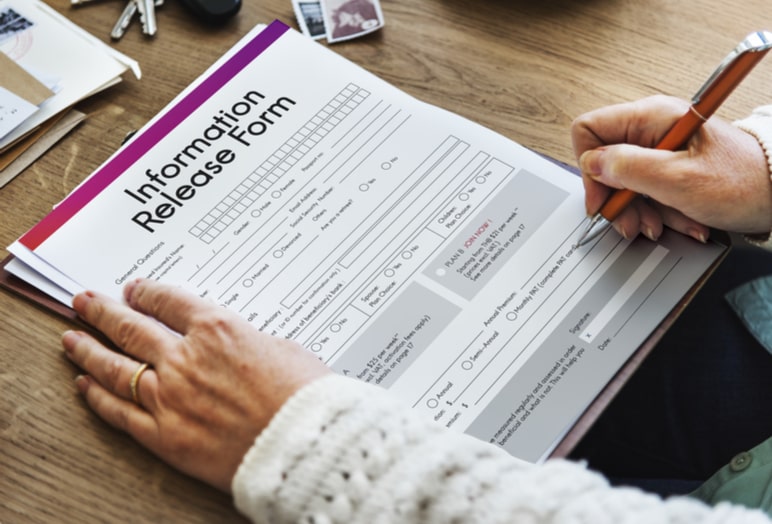Do You Need a Release for Medical Records for Continuity of Care

13 Jan Release of Information: Everything You Should Know

As the owner of an insurance company or law firm, you're likely familiar with a release of information. Many claims in both the insurance and legal industries are given the opportunity to be handled outside of the courtroom as cases can negatively impact the image of a company or firm. Whether presenting a settlement offer or releasing medical records to a third party for a case, the claimant is required to sign a release of information as a protective measure against unnecessary medical information being disclosed.
This blog provides an overview of what a release of information is, why it's important, and how medical records can be retrieved by one's self and on behalf of someone else.
What Is a Release of Information?
A release of information is a document that gives a consumer the opportunity to decide what material they want released from their medical file, who they want it delivered to, how long the data can be issued, and under what statutes and guidelines it is released. A release of information also allows for protections of both the consumer and the provider in releasing HIPAA information.
There are many reasons that may require a medical release of information, such as:
- Ensuring continuity of care
- Medical billing
- Health insurance billing
- Life insurance premium determination
- Data for legal proceedings
How to Get Medical Records
Health and medical records of any kind are confidential, meaning one party's medical records can only be accessed by them unless otherwise specified by law. Accessing and obtaining medical records follows a strict process, and requires that any requests to access or transfer medical records must be completed within a 30 day window.
1. Request The Medical Records
At times, legally requesting medical records requires that the request be made in writing. While medical record release forms vary in each state, there are typically four sections that an individual will have to complete:
- Releasor and recipient: The party that currently has the medical records, and who they will be sending them to must be identified.
- Time period: What are the dates being authorized for release?
- Record types: Are all the patients records being released or only specific ones?
- Expiration date: When does the request expire for legal purposes?
2. Sending The Letter
Rather than sending medical records in any form, it's best to verify with the medical facility in the initial request letter as to how the record should be sent. Today, medical records can be sent in various forms, such as:
- Electronic document (PDF, Word, etc.)
- USB flash drive
- CD
Often, medical facilities charge a small fee for sending records but it is prohibited to charge the requesting party for any processing.
3. Receiving The Medical Records
Requests for medical records should be processed quickly as usually time is of the essence. If five to seven days pass, and the requested information isn't received, the requestor can call to check on the status of the transfer. Medical facilities have 30 days to release requested medical records, and if this time frame is not met, an extension of 30 additional days can be granted if a letter is sent to the requestor with explanation as to why the request is delayed.
Note: By law, only one extension period is allowed.
Getting Medical Records on Behalf of Someone Else
It is possible for someone to obtain medical records on behalf of someone else. To access someone else's health records, you must be authorized to do so. You may be acting on their behalf with their consent, have been appointed as a power of attorney, or have another legal basis for access.
1. Personal Representative
At times, individuals appoint a third party as their medical power of attorney. This title gives the third party individual powers to obtain medical records. Aside from this privilege, the judgment claiming the individual as a power of attorney must be affixed to the HIPAA release form.
2. Adult or Guardian
Under federal law, adults and legal guardians are legally authorized to obtain the medical records of a minor. If the minor is receiving healthcare services for the medical records being transferred, State law may require the minor to provide consent to the outlined care.
3. Administrator of an Estate
There are a number of individuals that have authority to act on a deceased person's estate, from personal representatives and executors to administrators and more. If a deceased person's medical records are requested, the administrator identified in the party's Will or a court-appointed authority may obtain the records.
Get Expert Assistance for Your Medical Record Retrieval Needs
An effective release should prevent the risk, delays, and costs of a lawsuit into a solution that works for all the parties, with one blaming the other. Like an attorney preparing for trial, an insurance company should pay attention to the information included in a release from liability to present any future disputes on the same issue. There are many technicalities involved when it comes to release forms, and we encourage you to contact American Retrieval today for your medical record retrieval needs.
Source: https://americanretrieval.com/release-of-information-importance/
0 Response to "Do You Need a Release for Medical Records for Continuity of Care"
Post a Comment